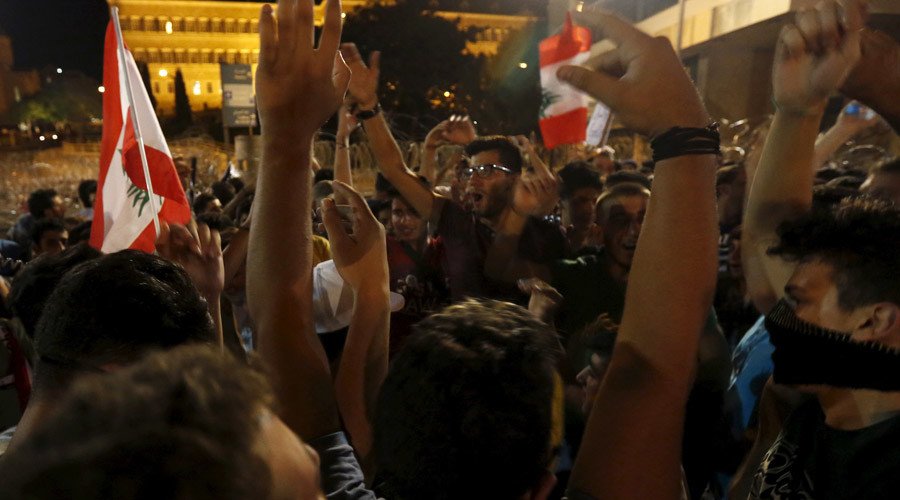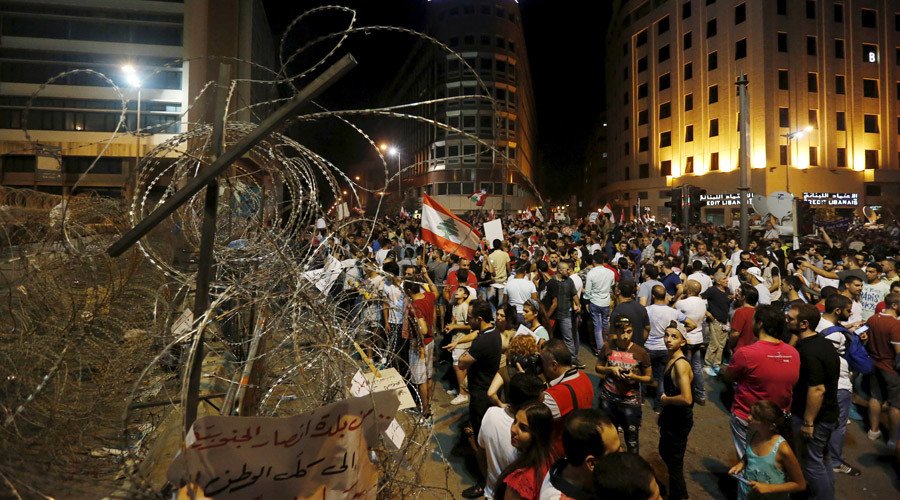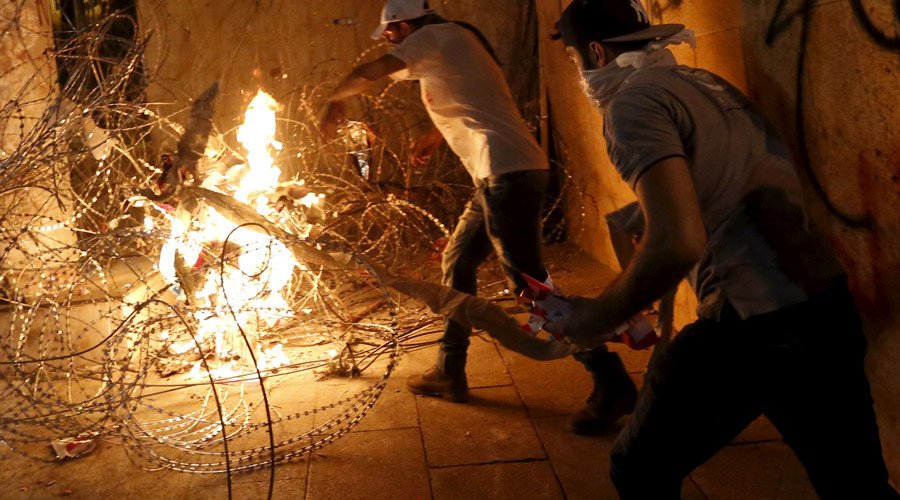'Make it a revolution!’: Lebanon protesters give 72-hour ultimatum to government
Thousands of street protesters in Beirut are demanding the resignation of two government ministers, after hundreds were injured in a similar demonstration last week. RT's Paula Slier reports that violence has again broken out.
READ MORE: Violence between riot police, protesters in Lebanon’s capital
The organizing movement behind the street protests, ‘You Stink!,’ said it would “escalate” its public protests unless the interior minister responsible for alleged police brutality was replaced along with the minister of the environment who is in charge of the ineffectual rubbish collection service that has left the streets of Beirut lined with trash. Its spokesman Rasha Halabi went further, however, telling a crowd that the movement will be pushing for new national elections.
LIVE: Protesters in #Beirut break through first set of barbed wire protecting govt complex http://t.co/9LFx26ZrJMpic.twitter.com/KEK6j1hLD9
— RT (@RT_com) August 29, 2015“This is not a protest for political parties. It is for all the Lebanese people... we are against the parties that are exploiting citizens,” international theater director Lucien Bourjeily, one of the figureheads of the movement, told AFP.
Police surrounding group of protesters #Beirut#YouStink LIVE: http://t.co/9LFx26ZrJMpic.twitter.com/XjA2EBH425
— RT (@RT_com) August 29, 2015Sunday’s protest was mostly peaceful, although RT’s Paula Slier reported that there were some pockets of more-radically minded activists taunting police, with some even attempting to break through the barricades erected around the presidential palace. As the crowd ebbed away, a hardy group remained, standing just meters from the ranks of the riot police, as they closed in.
#BEIRUT NOW: Several protesters cross second line of barbed wire http://t.co/9LFx26ZrJMpic.twitter.com/cMTXNeoQYZ
— RT (@RT_com) August 29, 2015I overhear one angry protestor saying hes going to get gasoline - definite group of angry youth here but they in minority #Beirut
— Paula Slier (@PaulaSlier_RT) August 29, 2015Slier cited security sources, which told her that police were told to refrain from using violence unless provoked in order to avoid the same kind of clashes that resulted in more than 300 people being hurt over two days last week.
But the RT correspondent said that she also witnessed a police unit ambushing a group of protesters, and causing a stampede, and the bodies of several unconscious demonstrators left unattended on the pavement.
Police came from a side road and started beating up everyone #Beirut
— Paula Slier (@PaulaSlier_RT) August 29, 2015It was chaotic_ riot police screaming and protestors running hysterically #Beirut
— Paula Slier (@PaulaSlier_RT) August 29, 2015Made our way back into the main road and saw protester unconscious on ground #Beirut
— Paula Slier (@PaulaSlier_RT) August 29, 2015According to Reuters, many of the demonstrators were chanting “Make it a revolution!,” while others adapted the Arab spring slogan: “People want the downfall of the regime!”
The situation has been tense in Beirut since July when the authorities stopped using one of the country’s main landfills in the town of al-Naameh, south of Beirut, and piles of rubbish began to appear on the streets of the capital.
On August 22, the protests turned violent, resulting in injuries among both protesters and police officers. Numerous videos released on social media show demonstrators throwing rocks and firecrackers at police. The officers responded with water cannon, rubber bullets and tear gas to tackle the demonstrators.
Following Saturday protests the Lebanese prime minister, Tammam Salam, described force used against protesters as “excessive” and promised that those responsible would be held to account.

“I warn that we are going toward collapse if matters continue. Frankly, I have not and will not be a partner in this collapse. Let all officials and political forces bear their responsibilities,” Salam said in a televised address last Sunday.
Later, Amnesty International called on the Lebanese authorities to investigate the use of excessive force of police on protesters.
“Lebanese security officials responded to overwhelmingly peaceful protesters in downtown Beirut by shooting into the air with live rounds, firing rubber bullets, tear gas canisters, and water cannons, and in some cases hurling stones and beating protesters with batons and rifles,” said Lama Fakih, senior crisis adviser at Amnesty International.
Lebanon: Security forces must refrain from using unnecessary or excessive force against peaceful demonstrations today http://t.co/M5jCf5RE7e
— AmnestyInternational (@AmnestyOnline) August 29, 2015She added that everyone on Lebanon has “the right to peaceful assembly.”
“Lebanese officials must uphold this right and send a clear message to security personnel that such attacks against peaceful protesters will not be tolerated… Even when responding to violence, security forces should never recklessly fire rubber bullets and other projectiles into crowds of protesters.”
Amnesty quoted Red Cross as saying that at least 343 people were treated for injuries and 59 more were hospitalized, following the rallies of August 22-23.
According to data from the country’s Internal Security Forces (ISF), 99 of their members had been injured in the protests, 30 of them seriously.

The political situation in Lebanon, which is riven by the sectarian divisions of its part-Christian, part-Shia, part-Sunni population, is very unstable, in part due to legislators being unable to pick a new president for more than a year.
Among the factors affecting the instability in the country are the war in neighboring Syria and the threat of Islamic State (formerly ISIS/ISIL).
READ MORE: Next target - Lebanon? Minister fears wave of ISIS-inspired bombings
According to editor of the Pan-African News Wire, Abayomi Azikiwe, the deadlock in the Lebanese elites is caused by the ongoing civil war in Syria.
“You have political parties on Lebanon, who support the opposition in Syria, and the other political parties, who support the Syrian government in Damascus,” he told RT, “It may appear to be a domestic situation but it can easily deteriorate into a clash that may not necessarily be controllable by the existing government and security forces inside the country.”
Political analyst Faisal Abd al-Sater fears that Lebanon may follow the scenario of other war-torn countries that have now been swept by jihadists.

“We are afraid the same situation will happen here as in Syria, Libya, Egypt … we don’t want to say directly that ISIS [now Islamic State, also known as ISIL] is on the scene but these protests could create violence that may open the door for ISIS to enter the Lebanese political game.”
READ MORE: Tear gas, water cannon: Dozens injured as police clash with protesters in Beirut (VIDEO)
Meanwhile, Johnny Kairouz, a social and political activist told RT that Lebanon needs to improve its “democratic system.”
“We need to have a more efficient way of dealing with the crisis, but it doesn’t mean that we want to eradicate everything because then we would be moving from the organized chaos that we live in, to a total anarchy, and anarchy will give us something else.”












